Charles E W Bean, Diaries, AWM38 3DRL 606/101/1 - February - March 1918 - Part 1
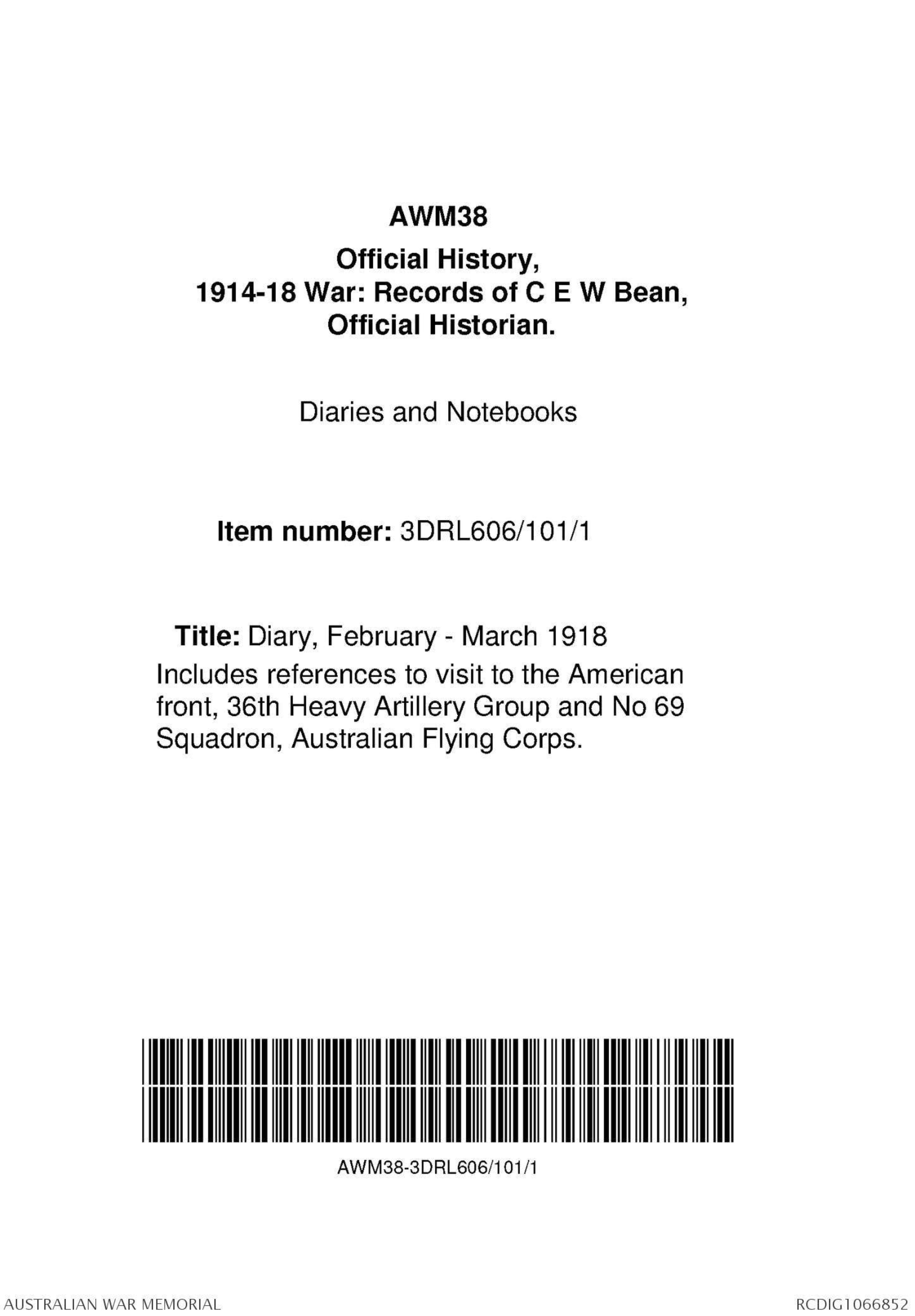
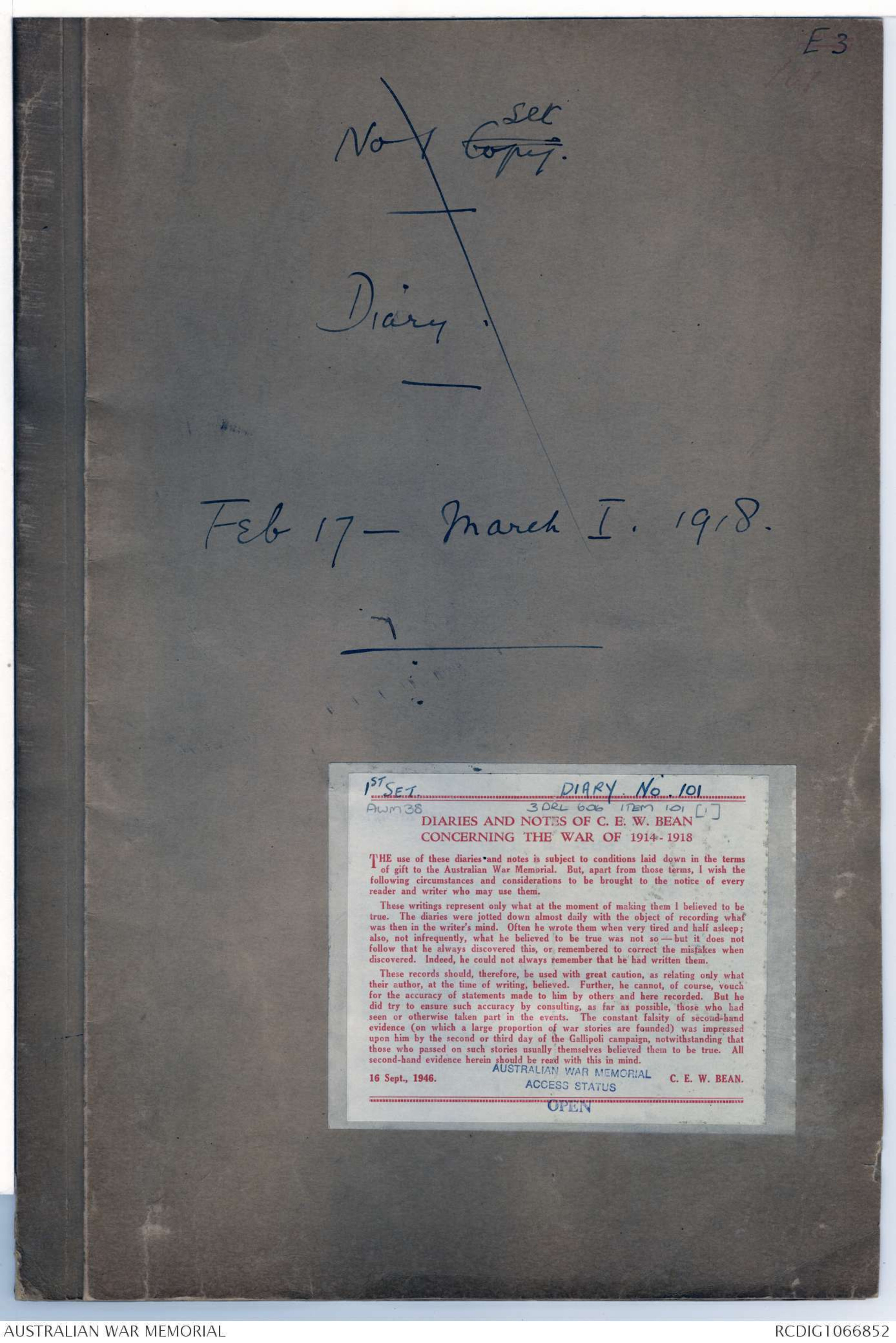
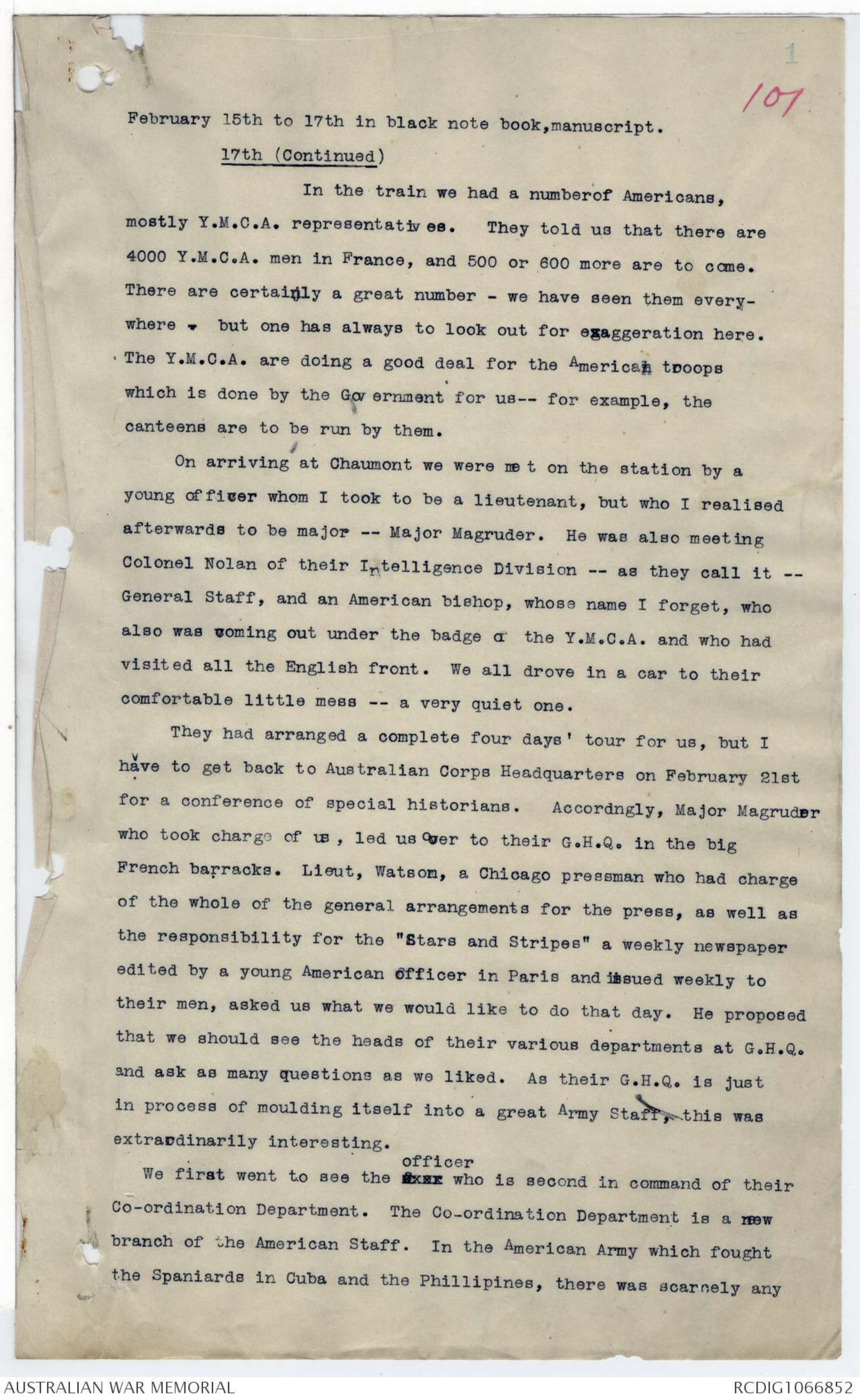
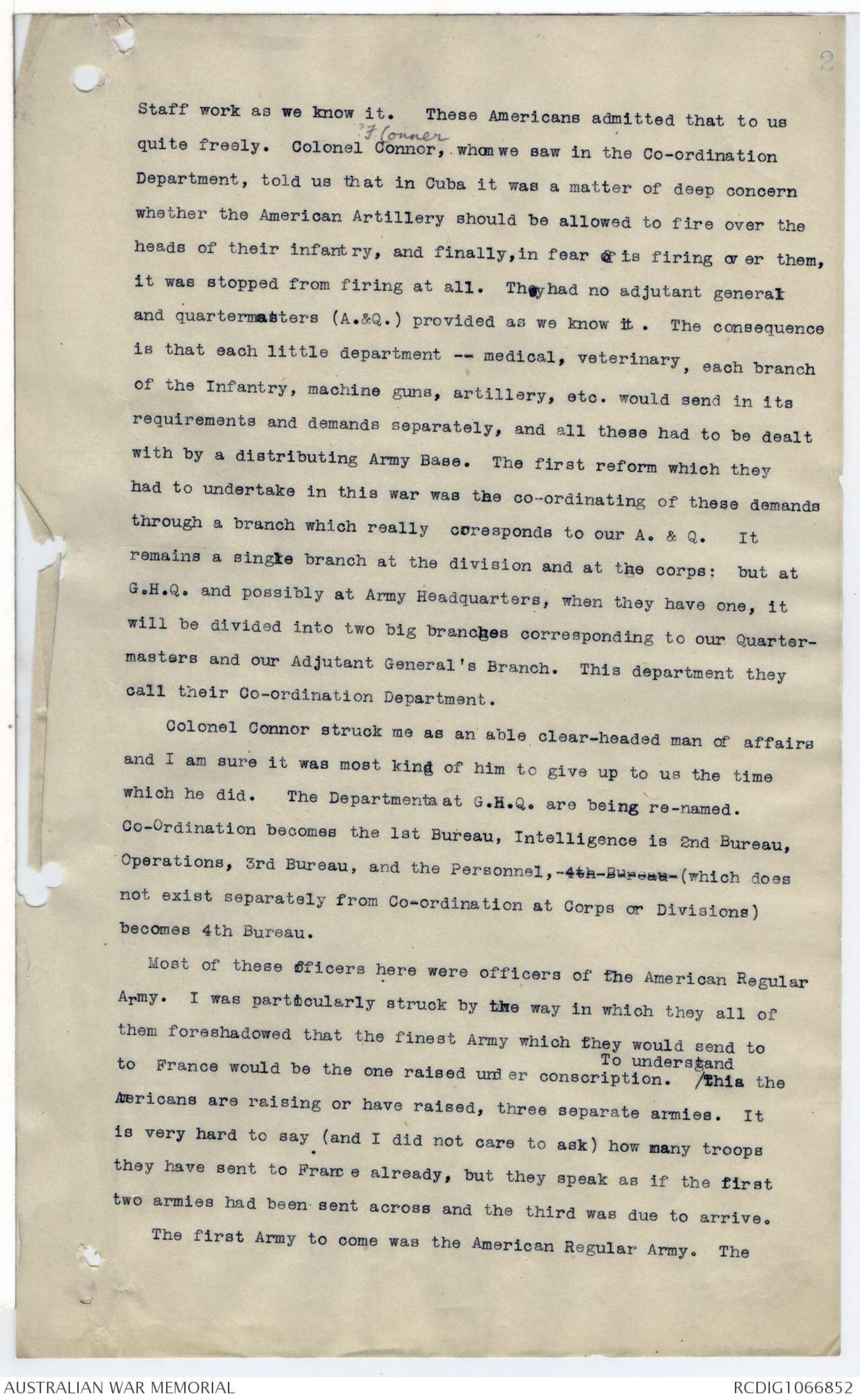
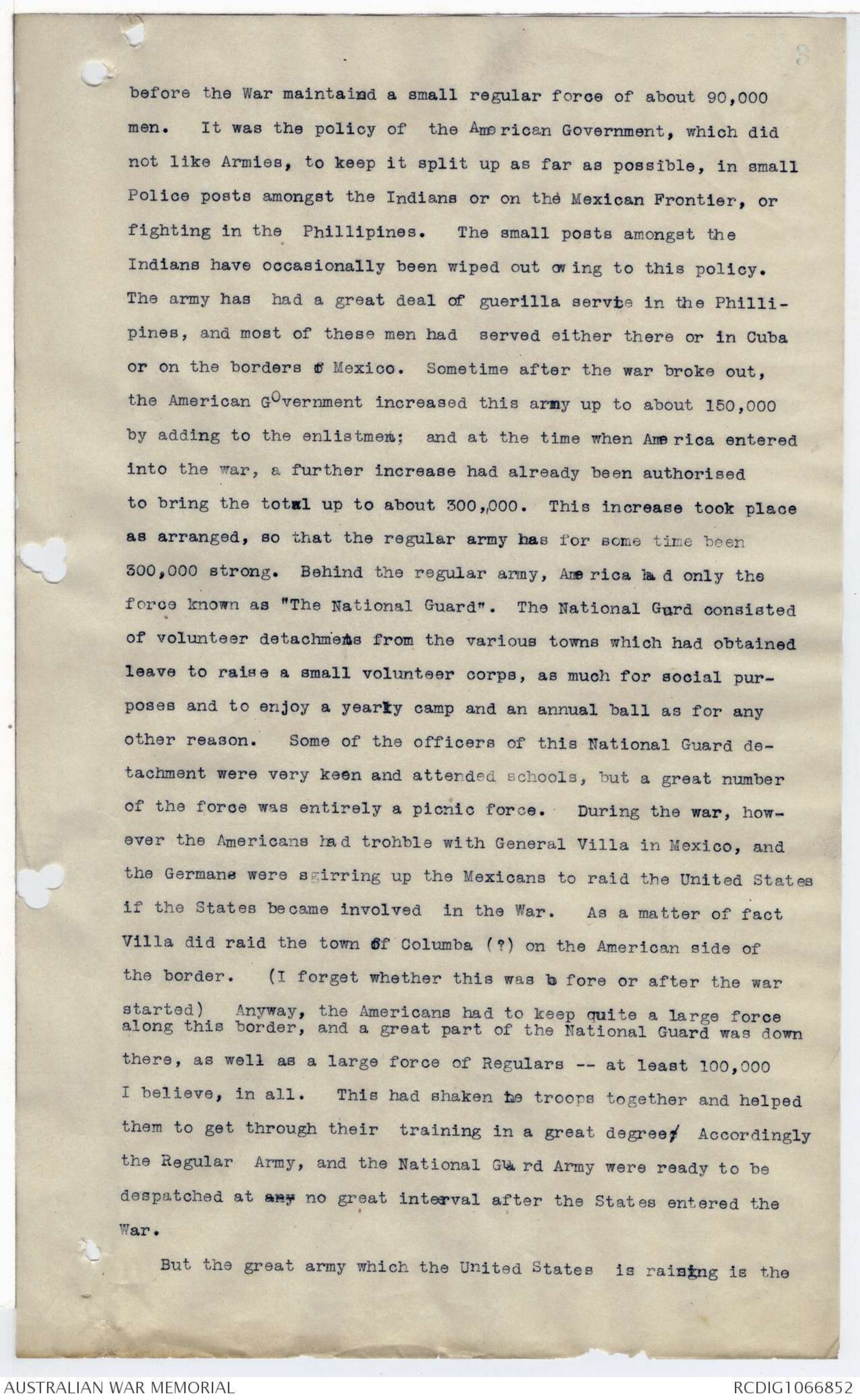
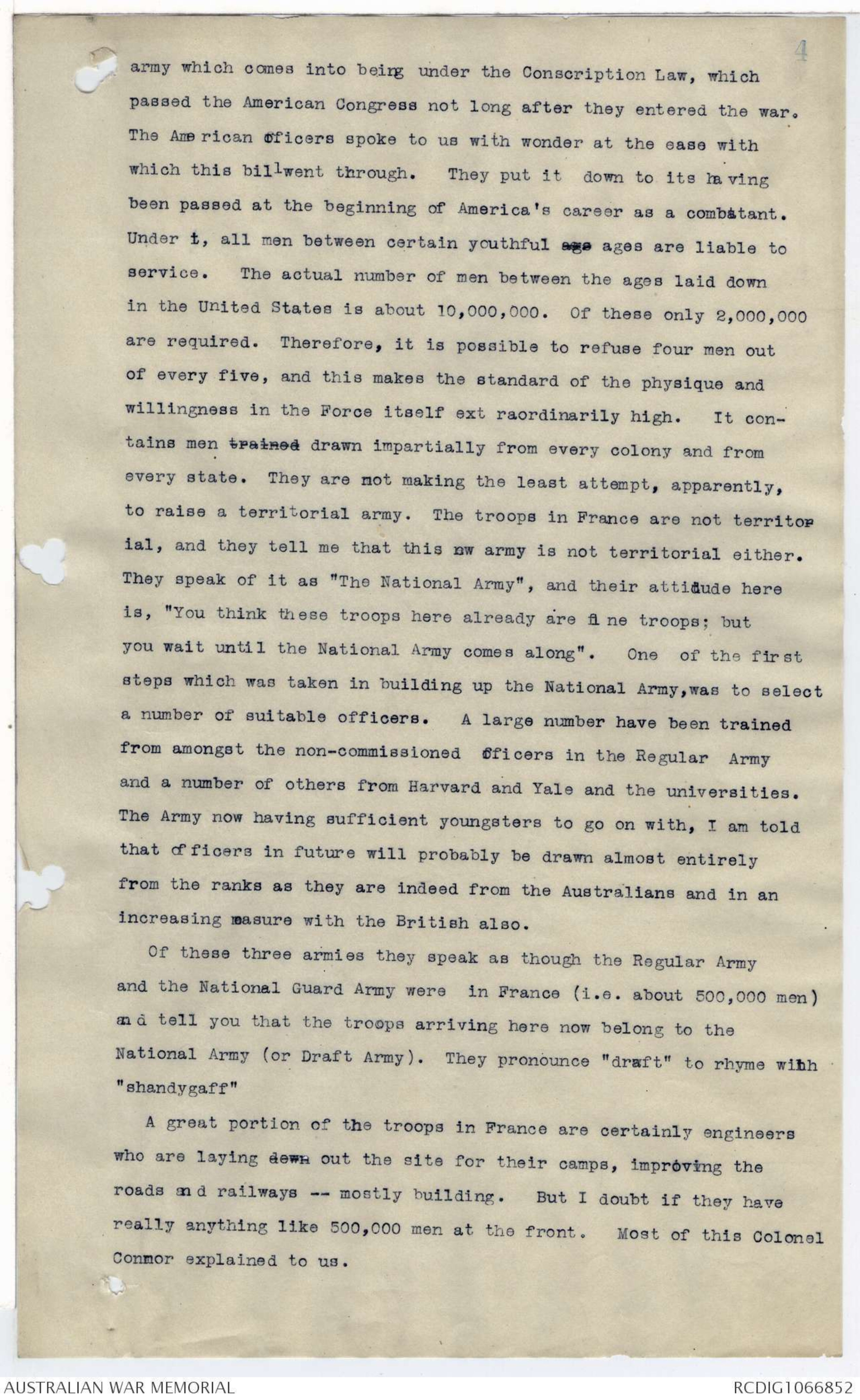
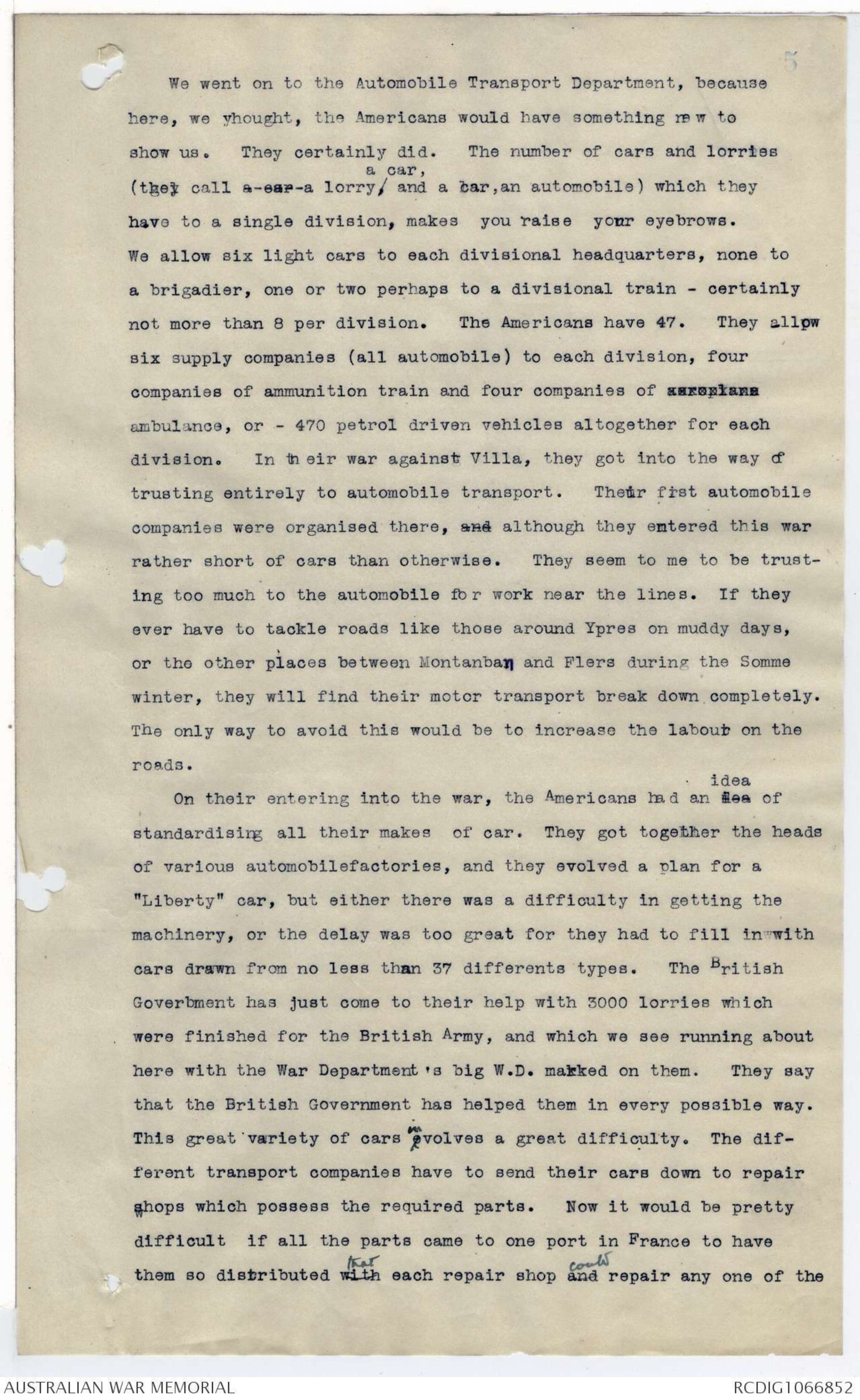
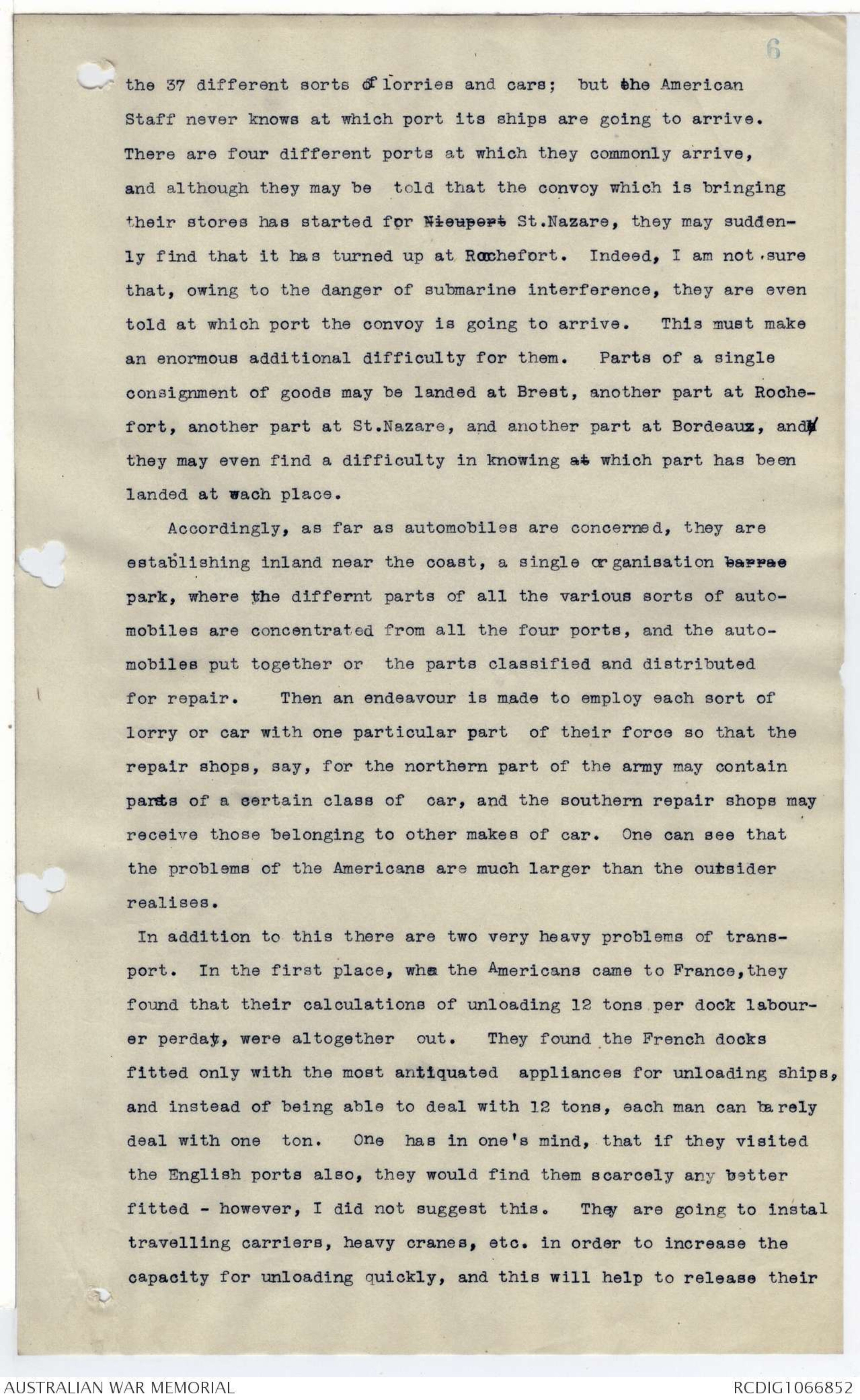
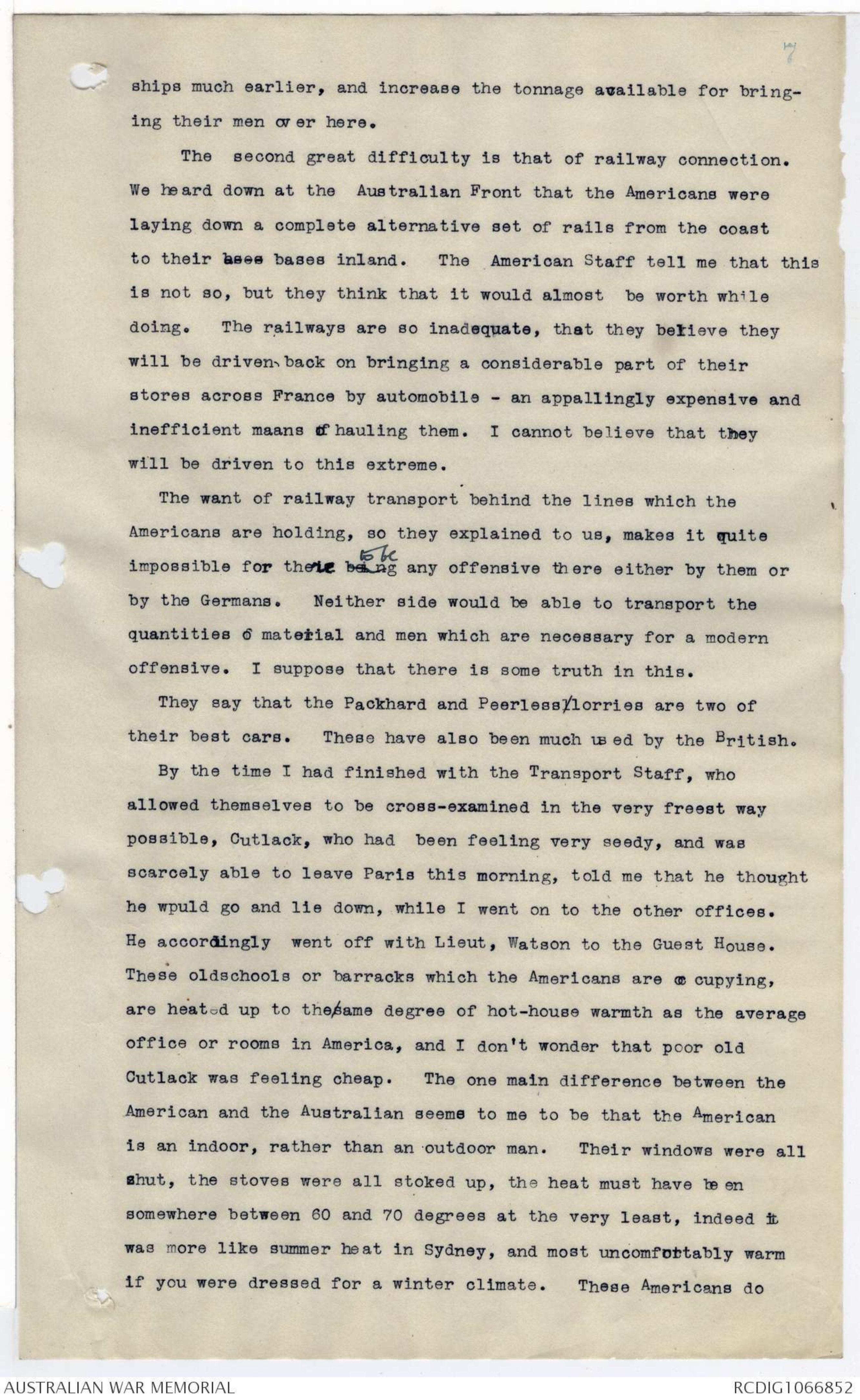
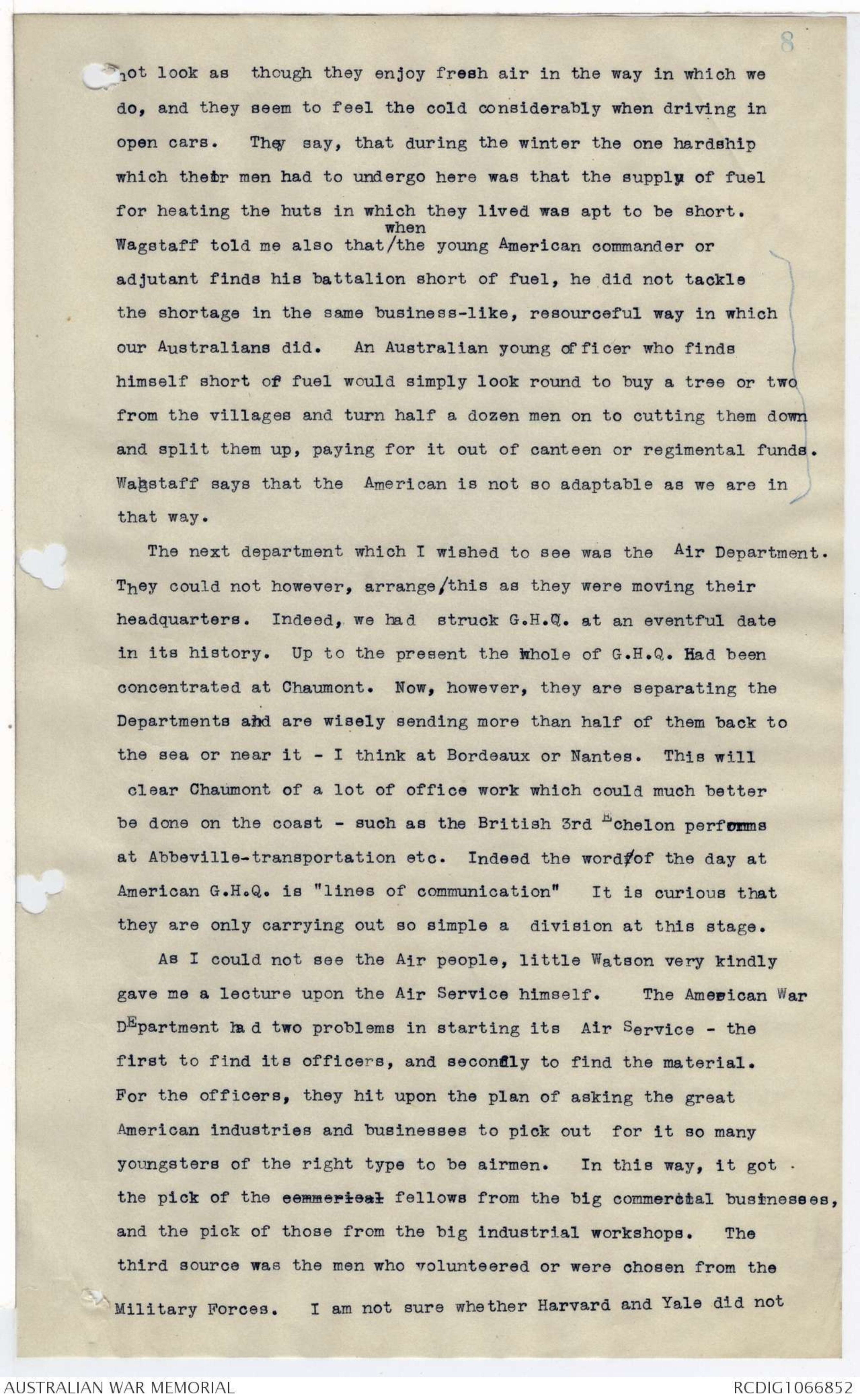
AWM38
Official History,
1914-1918: Records of C E W Bean,
Official Historian.
Diaries and Notebooks
Item number : 3DRL606/101/1
Title: Diary, February - March 1918
Includes references to visit to the American
front, 36th Heavy Artillery Group and No 69
Squadron, Australian Flying Corps.
AWM38-3DRL606/101/1
E3
No 1 Copy Set
__________
Diary .
____________
Feb 17-March I. 1918.
____________________
1ST SET DIARY No. 101
AWM38 3 DRL 606 ITEM 101{1]
DIARIES AND NOTES OF C.E.W. BEAN
CONCERNING THE WAR OF 1914 - 1918
The use of these diaries and notes is subject to conditions laid down in the terms
of gift to the Australian War memorial. But apart from these terms, I wish the
following circumstances and considerations to be brought to the notice of every
reader and writer who may use them.
These writings represent only what at the moment of making them I believed to be
true. The diaries were jotted down almost daily with the object of recording what
was then in the writer's mind. Often he wrote them when very tired and half-asleep;
also, not infrequently what he believed to be true was not so - but it does not
follow that he always discovered this, or remembered to correct the mistakes when
discovered. Indeed, he could not always remember that he had written them.
These records should therefore, be used with great caution, as relating only what
their author, at the time of writing believed. Further, he cannot, of course vouch
for the accuracy of statements made to him by others and here recorded. But he
did try to ensure such accuracy by consulting, as far as possible, those who had
seen or otherwise taken part in the events. The constant falsity of second-hand
evidence (on which a large proportion of war stories are founded) was impressed
upon him by the second or third day of the Gallipoli campaign, notwithstanding that
those who passed on such stories usually themselves believed them to be true. All
second-hand evidence herein should be read with this in mind.
16 Sep., 1946. C.E.W. BEAN
AUSTRALIAN WAR MEMORIAL
ACCESS STATUS
OPEN
1
107
February 15th to 17th in black notebook, manuscript
17th (Continued)
In the train we had a member of Americans,
mostly Y.M.C.A. representatives. They told us that there are
4000 Y.M.C.A men in France, and 500 or 600 more are to come.
There are certainly a great number - we have seen them everywhere
- but one has always to look out for exaggeration here .
The Y.M.C.A are doing a good deal for the American troops
which is done by the Government for us -- for example, the
canteens are to be run by them.
On arriving at Chaumont we were me t on the station by a
young officer whom I took to be a lieutenant, but who I realised
afterwards to be major--Major Magruder. He was also meeting
Colonel Nolan of their Intelligence Division-- as they call it --
General staff, and an American bishop, whose name I forget, who
also was coming out under the badge of the Y.M.C.A. and who had
visited all the English front. We all drove in a car to their
comfortable little mess -- a very quiet one.
They had arranged a complete four days' tour for us, but I
have to get back to Australian Corps Headquarters on February 21st
for a conference of special historians. Accordingly , Major Magruder
who took charge of us, led us over to their G.H.Q in the big
French barracks, Lieut, Watson, a Chicago pressman who had charge
of the whole of the general arrangements for the press, as well as
the responsibility for the "Stars and Stripes" a weekly newspaper
edited by a young American officer in Paris and issued weekly to
their men, asked us what we would like to do that day. He proposed
that we should see the heads of the various departments at G.H.Q
and ask as many questions as we liked. As their G.H.Q is just
in process of moulding itself into a great Army Staff, this was
extraordinarily interesting.
We first went to see the xxxx officer who is second in command of their
Co-ordination Department. The Co-ordination Department is a new
branch of the American Staff. In the American Army which fought
the Spaniards in Cuba and the Phillipines , there was scarcely any
2
Staff work as we know it. These Americans admitted to us
quite freely. Colonel Connor ?F Conner, whom we saw in the Co-ordination
Department, told us that in Cuba it was a matter of deep concern whether the American Artillery should be allowed to fire over the
heads of their infantry, and finally, in fear x is firing ov er them,
it was stopped from firing at all. They had no adjutant general
and quartermasters (A.&Q.) provided as we know it. The consequence
is that each little department -- medical, veterinary, each branch
of the Infantry, machine guns, artillery, etc. would send in its
requirements and demands separately, and all these had to be dealt
with by a distributing Army Base. The first reform which they
had to undertake in this war was the co-ordinating of these demands
through a branch which really corresponds to our A. & Q. It
remains a single branch at the division and at the corps; but at
G.H.Q. and possibly at Army Headquarters, when they have one, it
will be divided into two big branches corresponding to our Quartermasters
and our Adjutant General's Branch. This department they
call their Co-ordination Department.
Colonel Connor struck me as an able clear-headed man of affairs
and I am sure it was most kingd of him to give up to us the time
which he did. The departmenta at G.H.Q are being re-named.
Co-ordination becomes the 1st Bureau, Intelligence is 2nd Bureau,
Operations, 3rd Bureau ,and the Personnel,4th Bureau (which does
not exist separately from Co-ordination at Corps or Divisions)
becomes 4th Bureau.
Most of these officers here were officers of the American Regular
Army. I was particularly struck by the way in which they all of
them foreshadowed that the finest Army which they would send to
to France would be the one raised und er conscription. To understand/this the
Americans are raising or have raised, three separate armies. It
is very hard to say (and I did not care to ask) how many troops
they have sent to France already, but they speak as if the first
two armies had been sent across and the third was due to arrive .
The first Army to come was the American Regular Army. The
3
before the war maintained a small regular force of about 90,000
men. It was the policy of the American government, which did
not like Armies , to keep it split up as far as possible, in small
Police posts amongst the Indians or on the Mexican Frontier, or
fighting in the Phillipines. The small posts amongst the
Indians have occasionally been wiped out owing to this policy.
The army has had a great deal of guerilla service in the Phillipines,
and most of these men had served either there or in Cuba
or on the borders x Mexico. Sometime after the war broke out,
the American Government increased this army up to about 150,000
by adding to the enlistment; and at the time when America entered
into the war, a further increase had already been authorised
to bring the total to about 300,000. This increase took place
as arranged, so that the regular army has for some time been
300,000 strong. Behind the regular army, America had only the
force known as "The National Guard ". The National Guard consisted
of volunteer detachments from the various towns which had obtained
leave to raise a small volunteer corps , as much for social purposes
and to enjoy a yearly camp and an annual ball as or any
other reason. Some of the officers of this National Guard detachment
were very keen, and attended schools, but a great number
of the force was entirely a picnic force. During the war, however
the Americans had trohble with General Villa in Mexico, and
the Germans were stirring up the Mexicans to raid the United States
if the States became involved in the War. As a matter of fact
Villa did raid the town of Columba (?) on the American side of
the border. (I forget whether this was b fore or after the war
started) Anyway, the Americans had to keep quite a large force
along this border, and a great part of the national Guard was down
there, as well as a large force of Regulars -- at least 100,000
I believe in all. This had shaken he troops together and helped
them to get through their training in a great degrees Accordingly
the regular Army, and the National Guard Army were ready to be
despatched at any no great interval after the States entered the
War.
But the great army which the United States is raising is the
4
army which comes into being under the Conscription Law, which
passed the American Congress not long after they entered the war.
The American officers spoke to us with wonder at the ease with
which this billwent through. They put it down to its having
been passed at the beginning of America's career as a combatant.
Under it, all men between certain youthful age ages are liable to
service. The actual number of men between the ages laid down
in the United States is about 10,000,000. Of these only 2,000,000
are required. Therefore, it is possible to refuse four men out
of every five, and this makes the standard of the physique and
willingness in the Force itself ext raordinarily high. It contains
men trained drawn impartially from every colony and from
every state. They are not making the least attempt, apparently,
to raise a territorial army. The troops in France are not territorial,
and they tell me that this nw army is not territorial either.
They speak of it as "The National Army", and their attitude here
is, "You think these troops here already are fi ne troops; but
you wait until the National Army comes along". One of the first
steps which was taken in building up the National Army,was to select
a number of suitable officers. A large number have been trained
from amongst the non-commissioned officers of the Regular Army
and a number of others from Harvard and Yale and the universities.
The Army now having sufficient youngsters to go on with, I am told
that officers in future will probably be drawn almost entirely
from the ranks as they are indeed from the Australians and in an
increasing measure with the British also.
Of these three armies they speak as though the Regular Army
and the National Guard Army were in France (i.e. about 500,000 men)
and tell you that the troops arriving here now belong to the
National Army (or Draft Army). They pronounce "draft" to rhyme with
"shandygaff"
A great proportion of the troops in France are certainly engineers
who are laying down out the site for their camps, improving the
roads and railways -- mostly building. But I doubt if they have
really anything like 500,000 men at the front. Most of this Colonel
Connor explained to us.
5
We went on to the Automobile Transport Department, because
here, we thought, the Americans would have something new to
show us. They certainly did. The number of cars and lorries
(they call a car a lorry,/a car, and a car, an automobile) which they
have to a single division, makes you raise your eyebrows.
We allow six light cars to each divisional headquarters, none to
a brigadier, one or two perhaps to a divisional train - certainly
not more than 8 per division. The Americans have 47. They allow
six supply companies (all automobiles) to each division, four
companies of ammunition train and four companies of aeroplane
ambulances - 470 petrol driven vehicles altogether for each
division. In their war against Villa, they got into the way of
trusting entirely to automobile transport. Their first automobile
companies were organised there, and although they entered this war
rather short of cars than otherwise. They seem to be trusting
too much to the automobile fo r work near the lines. If they
ever have to tackle roads like those around Ypres on muddy days,
or the other places between Montanban and Flers during the Somme
winter, they will find their motor transport break down completely.
The only way to avoid this would be to increase the labour on the roads.
On their entering into the war, the Americans had an xxx idea of
standardising all their makes of car. They got together the heads
of various automobile factories, and they evolved a plan for a
""Liberty" car, but either there was a difficulty in getting the
machinery, or the delay was too great for they had to fill in with
cars drawn from no less than 37 different types. The British
Government has just come to their help with 3000 lorries which
were finished for the British Army, and which we see running about
here with the War Department's big W.D. on them. They say
that the British Government has helped them in every possible way.
This great variety of cars e involves a great difficulty. The different
transport companies have to send their cars down to repair
shops which possess the required parts. Now it would be pretty
difficult if all the parts came to one port in France to have
them so distributed with that each repair shop and could repair any one of the
6
the 37 different sorts of lorries and cars; but the American
Staff never knows at which port its ships are going to arrive.
There are four different ports at which they commonly arrive,
and although they may be told that the convoy which is bringing
their stores has started for Nieuport St.Nazare, they may suddenly
find that it has turned up in Rochefort. Indeed, I am not sure
that, owing to the danger of submarine interference, they are even
told at which port the convoy is going to arrive. This must make
an enormous additional difficulty for them. Parts of a single
consignment of goods may be landed at Brest, another part at Rochefort,
another part at St.Nazare, and another part at Bordeux, andx
they may even find a difficulty in knowing at which part has been
landed at each place.
Accordingly, as far as automobiles are concerned, they are
establishing inland near the coast, a single organisation xxxxx
park, where the different parts of all the various sorts of automobiles
are concentrated from all the four ports, and the automobiles
put together or the parts classified and distributed
for repair. Then an endeavour is made to employ each sort of
lorry or car with one particular part of their force so that the
repair shops, say, for the northern part of the army may contain
parts of a certain class of car, and the southern repair shops may
receive those belonging to other makes of car. One can see that
the problems of the Americans are much larger than the outsider
realises.
In addition to this there are two very heavy problems of transport.
In the first place, when the Americans came to France, they
found that their calculations of unloading 12 tons per dock labourer
perday, were altogether out. They found the French docks
fitted only the most antiquated appliances for unloading ships,
and instead of being able to deal with 12 tons, each man can barely
deal with one ton. One has in one's mind, that if they visited
the English ports also, they would find them scarcely any better
fitted - however, I did not suggest this. They are going to instal
travelling carriers, heavy cranes, etc. in order to increase the
capacity for unloading quickly, and this will help to release their
7
ships much earlier, and increase the tonnage available for bringing
their men over here.
The second great difficulty is that of railway connection.
We heard down at the Australian Front that the Americans were
laying down a complete alternative set of rails from the coast
to their xxxx bases inland. The American Staff tell me that this
is not so, but they think that it would almost be worth while
doing. The railways are so inadequate, that they believe they
will be driven back on bringing a considerable part of their
stores across France by automobile - an appallingly expensive and
inefficient means of hauling them. I cannot believe that they
will be driven to this extreme.
The want of railway transport behind the lines which the
Americans are holding, so they explained to us, makes it quite
impossible for there being to be any offensive there either by them or
by the Germans. Neither side would be able to transport the
quantities of material and men which are necessary for a modern
offensive. I suppose that there is some truth in this.
They say that the Packard and Peerless/lorries are two of
their best cars. These have also been much used by the British.
By the time I had finished with the Transport Staff, who
allowed themselves to be cross-examined in the freest way
possible, Cutlack, who had been feeling very seedy, and was
scarcely able to leave Paris this morning, told me that he thought
he would go and lie down, while I went on to the other officers.
He accordingly went off with Lieut, Watson to the Guest House.
These oldschools or barracks which the Americans are occupying,
are heated up to the/same degree of hot-house warmth as the average
office or rooms in America, and I don't wonder that poor old
Cutlack was feeling cheap. The one main difference between the
American and the Australian seems to me to be that the American
is an indoor, rather than an outdoor man. Their windows were all
shut, the stoves were all stoked up, the heat must have be en
somewhere between 60 and 70 degrees at the very least, indeed it
was more like summer heat in Sydney, and most uncomfortably warm
if you were dressed for a winter climate. These Americans do
8
not look as though they enjoy fresh air in the way in which we
do, and they seem to feel the cold considerably when driving in
open cars. They say, that during the winter the one hardship
which their men had to undergo here was that the supply of fuel
for heating the huts in which they lived was apt to be short.
Wagstaff told me also that /when the young American commander or
adjutant finds his battalion short of fuel, he did not tackle
the shortage in the same business-like, resourceful way in which
our Australians did. An Australian young officer who finds
himself short of fuel would simply look round to buy a tree or two
from the villages and turn half a dozen men on to cutting them down
and split them up, paying for it out of canteen or regimental funds.
Wagstaff says that the American is not so adaptable as we are in
that way.
The next department which I wished to see was the Air Department.
They could not however, arrange/this as they were moving their
headquarters. Indeed, we had struck the whole of G.H.Q. at an eventful date
in its history. Up to the present the whole of the G.H.Q. had been
concentrated at Chaumont. Now, however, they are separating the
Departments and are wisely sending more than half of them back to
the sea or near it - I think at Bordeaux or Nantes. This will
clear Chaumont of a lot of office work which could much better
be done on the coast - such as the British 3rd Echelon performs
at Abbeville-transportation etc. Indeed the word of the day at
American G.H.Q. is "lines of communication" It is curious that
they are only carrying out so simple a division at this stage.
As I could not see the Air people, little Watson very kindly
gave me a lecture on the Air Service himself. The American War
DEpartment h ad two problems in starting its Air Service - the
first to find its officers, and secondly to find the material.
For the officers, they hit upon the plan of asking the great
American industries and businesses to pick out for it so many
youngsters of the right type to be airmen. In this way, it got
the pick of the commercial fellows from the big commercial businesses,
and the pick of those from the big industrial workshops. The
third source was the men who volunteered or were chosen from the
Military Forces. I am not sure whether Harvard and Yale did not
 Sam scott
Sam scottThis transcription item is now locked to you for editing. To release the lock either Save your changes or Cancel.
This lock will be automatically released after 60 minutes of inactivity.